
Mr. and Mrs. Roddenberry regretfully announce
the passing of their beloved franchise
Star Trek
beyond the bounds of this fragile Earth
and into the final frontier.
You are warmly invited to attend the funeral service,
to be held at Sunshine Meadows Mortuary
this Saturday at 10 a.m.
In lieu of flowers, the family requests that you make
a donation to the Save the Klingons Foundation.
Lunch will be served.
Well, it Finally Happened
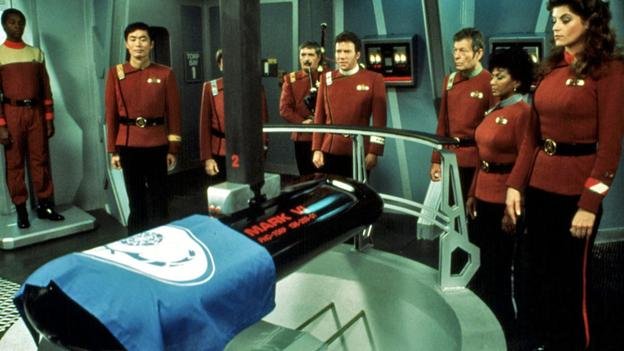
*Sigh* I don't wanna go to a funeral on Saturday. This week has been depressing enough already.
But I guess it's unavoidable, since Star Trek is now definitely dead.
Mr. Devil's Advocate: "How can you say that?"
Huh?!
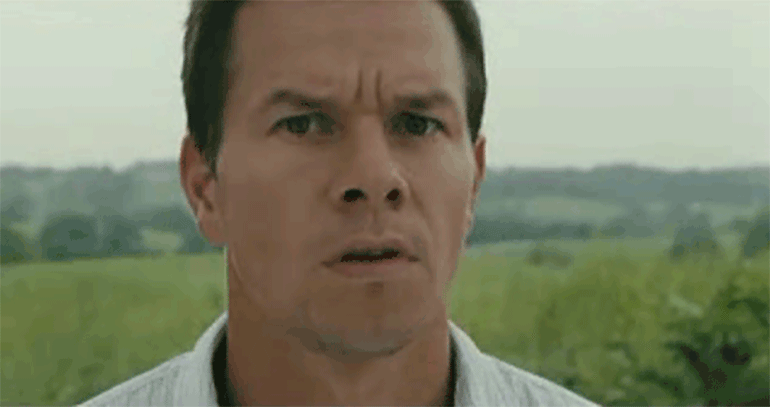
What are you doing here, Mr. Devil's Advocate? This is a Netflix review. You never show up for those.
Mr. DA: "I know." *clears throat and sniffs* "I need a place to hide."
Okay. Uh...is something wrong?
Mr. DA: "I might've ticked off the boss again. And this time, it may be serious."
Well, I'll gladly harbor you. Would you like a bagel?
Mr. DA: "Never mind that. As long as I'm here, I might as well stop you from shooting yourself in the foot (like always). So perhaps you'd like to walk back your premature declaration of Star Trek's death."
Not even a little. Truth be told, the franchise has been dead for years. People kept clinging to the corpse for a long time, and only now are they burying it.
But that can't Be True
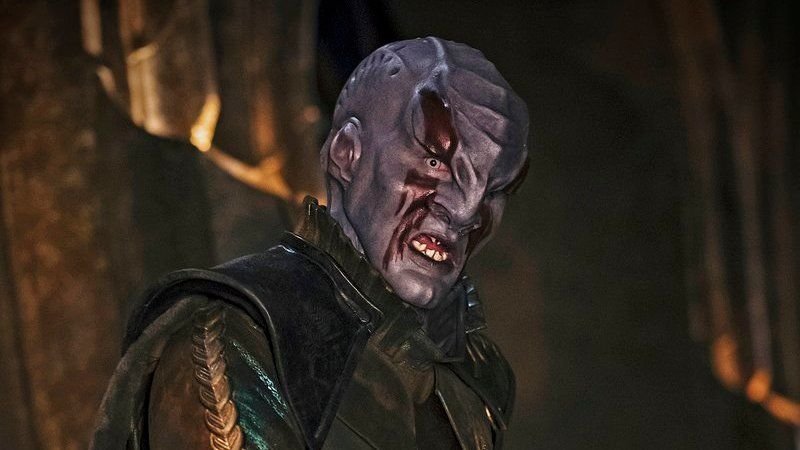
Mr. DA: "Perhaps you are unaware of the brand new Trek series, Star Trek: Discovery?
Perhaps you are unaware of the overarching problems with that series, with the consensus being that
- It does not work as a Star Trek series, and
- It does not work as competent science fiction.
Mr. DA: "That's rich, coming from a self-professed Star Trek hater."
The Word of a Nonbeliever

It's true: I am a Star Trek heretic. I hate the franchise, and have always hated it.
My antipathy likely stems from childhood experience. I grew up in the 90s, and I keenly remember how my mother was never available on wednesday evenings, even when I really, really needed her help with something.
Furthermore, I've always found the main characters of each Trek installment to be little more than a gaggle of stuffed shirts, spouting platitudes about freedom and exploration while slavishly upholding an authoritarian super-state that brooks no dissent. These are not the kind of "heroes" I root for.
Nevertheless, Star Trek has been an unavoidable facet of my life. Even after becoming an adult and leaving my family home, I found myself often yoked to Trekkies, including roommates and mission companions. I have ended up watching far more episodes and movies of this phenomenon than I would have cared to. And I could not escape lengthy discussion about the franchise throughout my adult life. I know an uncharacteristic amount of Trek trivia, mostly due to the fact that my brain does not allow me to forget any kind of trivia, even when I badly wish to.
And with all my knowledge of the franchise, I can say that it is well and duly over.
What Killed Star Trek
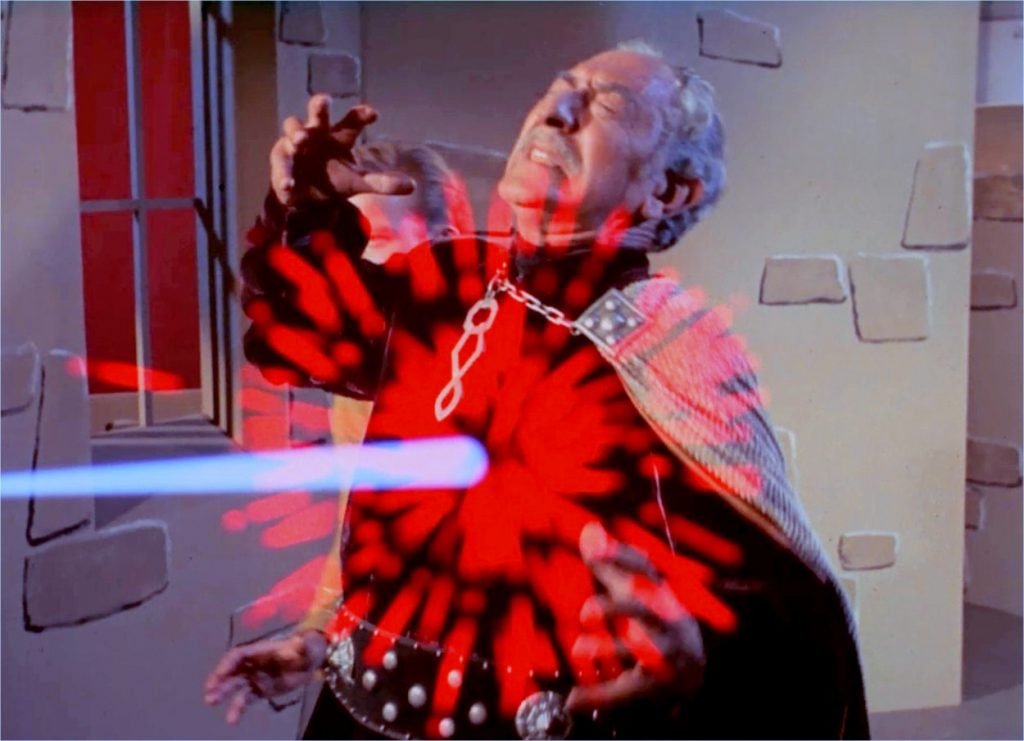
Mr. DA: "If you're so certain of your position, then perhaps you could explain what killed this franchise. Was it a lack of studio interest?"
No. The franchise has often failed to excite studio executives, yet it has always bounce back from those setbacks.
Mr. DA: "Then perhaps it was the fans?"
The fans had a hand in Star Trek's demise. But they are not what killed it.
Mr. DA: "Then are you suggesting that they ran out of stories to tell?"
That would be impossible. There is no end to the amount of stories that can come forth from a single universe. And Star Trek's universe was large enough for many more seasons of many more shows.
Mr. DA: "Then who did the deed?"
The future. The future is what killed Star Trek.
A Prophecy Unfulfilled
Star Trek's vision of the future is no longer compatible with reality. Since the release of the original Star Trek series, the real future has played out in a way completely antithetical to the future that the show promised.
Tell me, what sense does it make to have a starship where all the craft's various functions are manually operated? If man ever does master interstellar travel, why would he require his starships to be operated by a full staff of people sharing a single bridge? Such a scenario would require
- A pilot to manually steer the ship.
- A communications officer to manually set up video phone calls.
- An engineer to manually run the ship's functions.
- A doctor to manually diagnose and treat illnesses.
- A science officer to manually scan for life forms.
- A captain who needs all these people to do these things for him.
The modern viewer watches an episode of Star Trek and wonders why the ship's bridge needs more than a single human operator. Why not leave it to the ship's futuristic computer steer the vessel, set up the phone calls, scan for lifeforms, detect and repair its own malfunctions, ask Google Maps for directions, and add new tracks to your playlist based on your listening preferences?
Looking back, it all seems kind of silly.
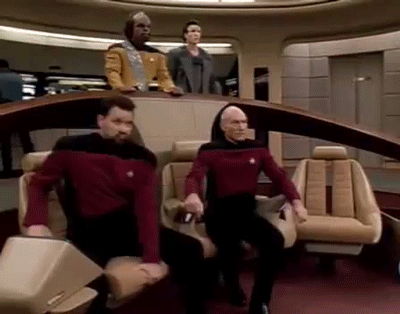
The saddest part, though, comes from knowing how the franchise almost saved itself. It tried to adapt to a changing world, and in the early 2000s, Star Trek: Enterprise was launched. This new series did everything right to bridge the gap between the future Star Trek promised us and the future we were already living in.
And fans rejected it because it wasn't the Star Trek they remembered.
When Enterprise died, Star Trek died. There, I said it. All the other attempts made since then---the already forgotten prequel movies, as well as Discovery, have been nothing more than the beating of a dead horse. It's time to put this franchise to rest.
But Wait...
Ah, but I am forgetting the miracle of time travel, as provided by Netflix.
It's true that no new Trek series is ever going to be true again, but that doesn't mean that the already-existing serieses can't be enjoyed. The viewer can go back and view all the old Star Trek shows, as many times as they like, to take what enjoyment they can.
And there is one series, from the old era, that many people have yet to try. To those looking for a good and new Star Trek, this show provides the next best thing.
I am, of course, referring to Star Trek: The Animated Series.
The Lost Chapter
That's right: Star Trek had a brief animated stint.
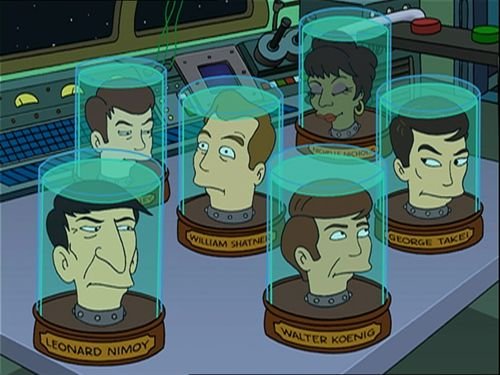
No, not that one.
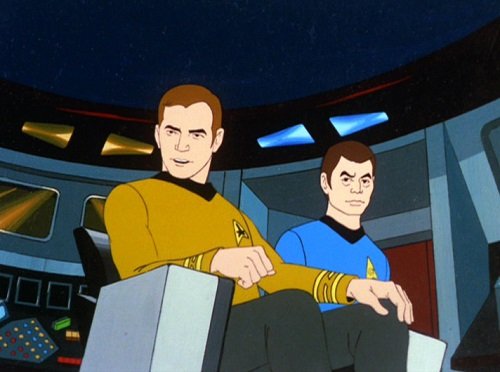
That's right: I'm talking about 1973's Norweigian-animated, 22-episode cartoon series featuring the voices of (most of) the cast of the original Star Trek.
Mr. DA: "I've heard of that show. Isn't it supposed to be completely awful?"
Actually, it's the best Star Trek property ever produced.
Mr. DA: "WWHHHAAAA...?"
The Merits
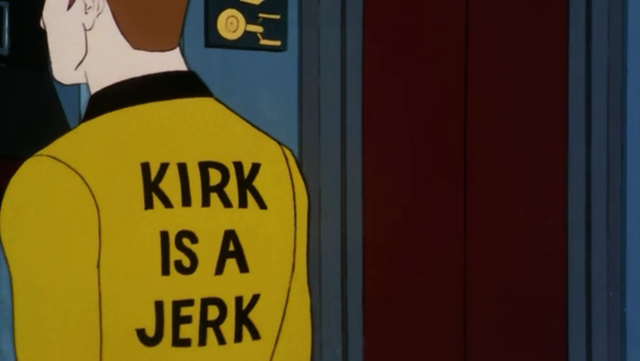
I have watched all episodes of Star Trek: the Animated Series, and I am convinced that it surpasses all other interpretations of Star Trek ever made, and will continue to do so for all time.
I further argue that the reasons for this assessment are not difficult to apprehend, and that even the most sensitive Trekkie ought to come to the same conclusion, as the animated series benefits from a significant number of advantages, such as:
- Resorting to animation spares us from watching the actors let themselves go (I'm looking at you, Mr. Scott).
- Animation allows for a larger variety of alien designs, rather than resorting to the "Looks almost entirely human but with a couple of facial prosthetics" method that other Treks constantly resort to.
- Animation allows for a broader array of special effects than was seen in the original series, and the hand-drawn animated effects have aged much more gracefully than the cgi hobgoblins seen in the 90s outings.
- The animated series retains the themes of the original shows, showcasing heady science fiction ideas in exotic settings.
- Animation allows for more exotic settings, including adventures that take place underwater or in sprawling alien cities.
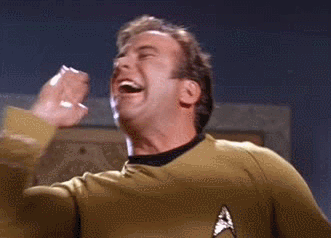
It really was a necessary change.
And despite the animated nature of the show, the stories took a surprisingly mature stance on certain subjects, including lethal self defense, wrongful accusations, interspecies relationships, and all the moral dilemmas Star Trek is known for. The show was definitely not watered down for a juvenile audience.
My Judgment
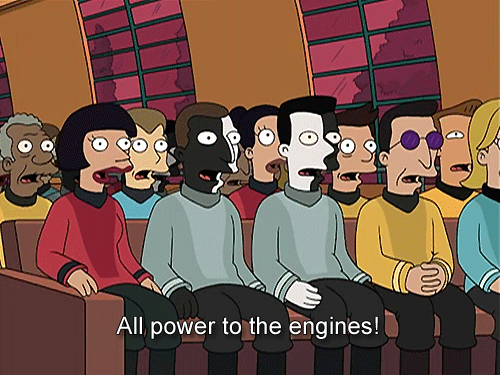
Star Trek: The Animated Series is the very best Star Trek. It is the uttermost top of what the franchise has to offer. It's intelligent, well-written, and blessedly short.
All 22 episodes can be found on Netflix. At only 22 minutes long, these episodes are highly digestible. I feel like I could recommend this series to anyone, even those who can't stand the rest of the franchise.
I can only hope that more people discover this gem of a show.
Previous entries in the Netflixing series:
Past Years
TV Shows
Movies
